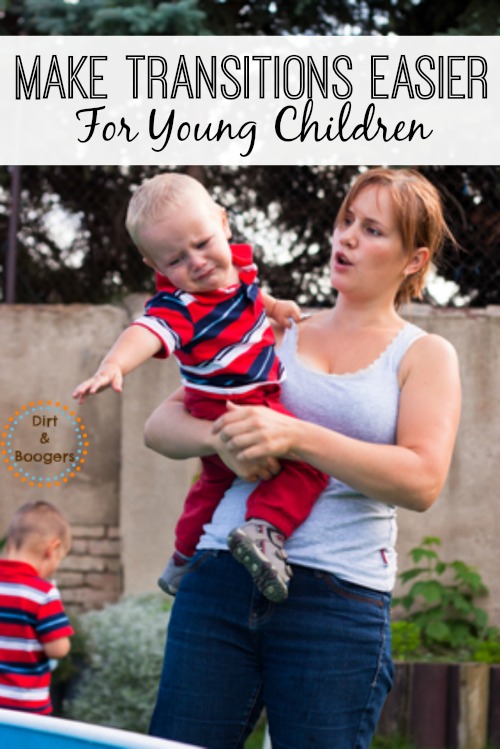One of the more difficult times of the day for young children (and their parents) are transition times. You know the times. Like when you tell them that it’s time to leave the park or stop playing to move onto another activity, like dinner or diaper changes. Often these times can lead to big temper tantrums and complete break downs for little ones.
I’ve compiled a few parenting tips to help during these tough times. These tips have worked for me for years with many different aged children. They aren’t full proof and there will still be times a child has difficulty transitioning, but they sure do make things easier most of the time.
1. Give lots of choices throughout the day: Giving choices really helps a child feel in control of their life and more connected with their caregivers. If a child is given a choice and a caregiver complies with that choice than the child feels heard and respected. You will find that when a child feels heard and secure, they are more likely to comply with directions from their caregiver.
2. Let your toddler choose when it’s time to leave: Ok, ok, I know this sounds weird, but hear me out. Let’s look at an example of what I mean: We’re playing at the park and I know we need to leave in 15 minutes. Its now that I give a choice. I often say “Hey J, do you want to leave the park in 15 minutes or right now?” This helps him feel like he has a choice in when playtime is over and it prepares him for transition. More than likely he will say that he wants 15 more minutes.
3. Set a timer: My timer is now my new best friend. I set a timer a ton throughout they day, because it works! After I give him the choice, I set the timer on my phone (I have a simple kitchen timer app, an egg timer works great too). When the timer goes off, J knows it’s time to go. The great thing is that it’s not me telling him when it’s time to go…it’s the timer! Plus, it helps me keep track of time too.
4. Give reminders: In the 15 minutes that he’s chosen to play I’ll give J at least 2 reminders that when the timer goes off it will be time to go. Again, I am preparing him for the transition.
5. Ease the transition: I don’t ever abruptly end J’s play, or I know a temper tantrum is likely. I always say something like “Ok, J you had 15 minutes and the timer has gone off…it’s time to go”. Sometimes this works the first time…not often. I may have to say this a couple of times before he’s ready, but I always try to get him to go on his own.
If he’s having a really hard time transitioning, I’ll give a choice. “Ok, J do you want to run home from the park, or hold my hand”.
If he still refuses. I’ll say, “since you chose not to make a choice, you’ll have to hold my hand on the way home”. Most of the time it doesn’t get to this point, but every once in a while I do have to lead him away.
If transitions are still hard, consider these things:
1. Is your family overscheduled and there are too many transitions in your child’s day? Children need time to play and can get frustrated if they don’t get it. This can lead to more frustration during transition times. This post my Little Moments explains it beautifully.
2. Use a transitional object. Allow your child to take toy that they were playing with in the car or to the changing table. This lets the child know that you see the importance in what they were doing and the play can continue during the transition. I often give J a choice on if the wants to bring a toy and what toy he chooses.
3. Have a routines in your day. The more routines, the easier the transition. As an example: J knows that he gets to watch 2 tv shoes before breakfast. He is already prepped and ready to go eat breakfast when that second show is over. There isn’t much of a fight because it’s the same thing every morning….it’s predictable.
4. Pay attention to their basic needs. A hungry and tired child will not transition as well as a rested, fed child.
5. Stay calm. The calmer you are, the calmer your child will be. This is so true during transitions. Instead of yelling and pushing your child to move. Try staying calm and easing them into the transition. I know that this can be easier said than done, especially when you’re in a hurry, but you will get out of the house sooner and with a calmer child if you can stay calm too.
6. I’ll say it again….choices, choices, choices! The more choices a child gets, the more compliant they will be! Trust me.
Do you have any other tips on transitions that work for you? I’d love to hear them!
Here’s another great post by Toddler Approved with some other great ideas on toddler transitions.
Click the picture below to register for this free webinar!
**********************************
Join the thousands of others who subscribe to our weekly newsletter, so you can stay up to date with everything happening on Dirt and Boogers. No spam…I promise!




At the end of the summer, Bobo and I went down the “barbecue” aisle of Hobby Lobby and he chose a Hamburger timer as his official timer. It’s adorable! I like that it’s his special timer used only for him.
What a fun timer! I’ve been amazed at how well a it works.
Something that has usually worked with our son since he was quite small is to have him say goodbye or goodnight to whatever it is he’s having a hard time leaving. Even if it’s when he’s resistant after all of the other tricks you have listed, a final, “Say ‘goodbye swings, I’ll be back another day'” has worked wonders. At two and now at nearly-five, saying goodbye still helps him make that final transition much more happily. (The trick has been remembering to use this!)
Thanks Wendy…I totally forgot about that one! We do it too and it really does help a lot. Thanks for the comment!
Hey Amanda, I’ve had luck with #5 above. I’ve gone as far as just stopping everything, accepting that we’re going to be late to wherever we’re going, and then we continue getting ready without hurrying. When I find myself freaking out because I’m in a hurry and no one is cooperating, I force myself to remember a bad morning in which I rushed the boys so much that I made Bug cry because he was so scared of my yelling. Being on time isn’t worth having that happen again. The kids are so much more cooperative when we’re not rushed.
Thanks Dawn! I totally agree. I too have made J cry in my mad rush to get out of the house. Unfortunately, staying calm can be super hard, but so worth it in the end.
Little kids, I think are so much easier than teens (I have 3 kids – 24, 14 and 5; yes all almost 10 yrs apart hee!hee!). I don’t get flustered over the tantrums. So, yes, staying calm is a big then. I never gave very many warnings really when we had to leave. They only got a couple of minutes from when I said. Like mentioned, if they are over tired, etc. more chances of a meltdown. I always set clear boundaries too. Mine didn’t have very many meltdowns.. more bummed they had to leave if it was something fun. I just stated that we could come back at a later date. If the melt down continued, I just pick them up and carry them out.
As for rushing in the morning…that is a tough one when you have POKEY kids who LOVES to dawdle when they have to be out the door for school. I love natural consequences. My littlest is in kindy this fall. He decided to drag his feet this morning. He loves his teacher and loves sitting right up front next to her. Natural consequence – he didn’t get is favorite spot on the rug for circle time they have right away in the morning. I am guessing tomorrow, he won’t be dilly dallying. 😉
I love those natural consequences!!
The timer definitely helps … I use the phone alarm and it is for some reason treated with much more respect than me!
We did go through a phase though at about two when major transitions from one place to another were really distressing. It passed but am not sure whether it was just a phase or more fundamental anxieties.
Hi Amanda,
I’ve just recently come across you blog and was wondering if you had looked into or heard about Magda Gerber’s Educaring approach also known as RIE. As an early childhood educator it is a philosophy I worship which influences my practice. A lot of what you speak about correlates with Magda’s notion of raising/guiding young children; so was just curious to know whether you had heard of the approach before.
Much love,
Tori
I have heard of Magda Gerber and RIE, but haven’t really read anything about it. I mostly learned how to talk to communicate this way with children while working on my Masters. I’ll have to look at some of her stuff. Thanks!
I have found the choice concept works excellent at our house. I have always given my daughter a choice from what she wants to eat to what she wants to wear. I pick two things that I want her to have/wear etc and let her pick which one. That way she feels in control, yet she is still making a choice of what is appropriate for the situation. I have yet to have a fight over getting dressed, getting in the car or what she wants to eat. And now that she is 4 she is making her own choices without me prompting with the appropriate items all on her own.
My 22 months young lady has a schedule since she was around 6 (when she started to eat solids). It helps a lot because you can know easily what they want (eat, sleep, etc.). If she is playing at evening I tell her it’s time to bubble bath and she immediately go inside. If its another time of the day I asker to go inside for a snack that I know she loves. Although some times I feel nothing is working, I have to solve the situation before she starts craying or yelling.